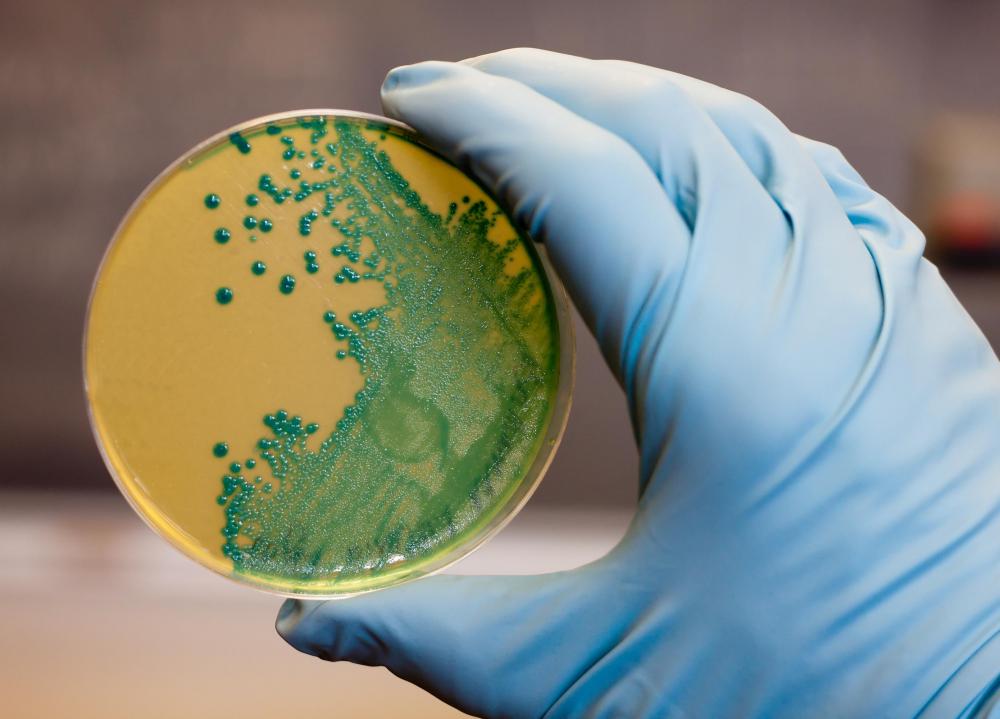At WiseGEEK, we're committed to delivering accurate, trustworthy information. Our expert-authored content is rigorously fact-checked and sourced from credible authorities. Discover how we uphold the highest standards in providing you with reliable knowledge.
How do I get Started in Microbiology Research?
Microbiology research has many different important applications, from medicine to food safety to biotechnology. Scientists generally work in modern laboratories found at universities, private research facilities, pharmaceutical companies, research and development institutions, and biotechnology firms. An individual who wants to get started in microbiology research must usually obtain an advanced degree from an accredited university, gain experience in assistant or intern positions while in school, and complete a fellowship after graduation.
A person usually begins preparing for a career in microbiology research while attending a four-year college or university. A future microbiologist generally takes several biological science courses that integrate laboratory studies into the curriculum. Classes in organic chemistry, molecular biology, and physics allow students to learn about the history of microbiology research, present trends and applications, and different research techniques. Many undergraduates choose to enroll in advanced mathematics and statistics courses as well, which introduce them to the fundamentals of establishing research guidelines and analyzing numerical results.

An undergraduate student who plans on pursuing a microbiology career can gain valuable experience by working as an intern or research assistant at his or her university's microbiology laboratory in between school terms. Many schools offer students the chance to engage in meaningful research while completing their bachelor's degrees, providing hands-on learning experiences and improving their chances of gaining admission into accredited microbiology schools. While in the last year of a bachelor's degree program, a student usually begins applying to schools and takes various entrance exams which test their competence.

Some future scientists enroll in two-year master's degree programs, though most hopeful microbiologists pursue PhDs in the field, which takes from three to five years on average to attain. Graduate and doctoral students usually receive intensive, detailed classroom and laboratory instruction on specific microbiology subjects. Individuals are usually required to design and conduct independent research projects, and report their findings in the form of a lengthy thesis or dissertation. Most microbiology schools help their graduates find fellowship positions in universities or private research institutions.

A microbiologist fellow spends a period of up to two years working as an assistant researcher to established professionals in the field, learning how to submit grant proposals, design studies, set up experiments, analyze results, and write scientific papers. A new microbiologist who shows promise may be allowed to design and carry out original projects, under the supervision of experienced scientists. Once a fellow has proved his or her skills, he or she can usually begin conducting independent microbiology research.
AS FEATURED ON:
AS FEATURED ON:














Discussion Comments
@sunnySkys - I actually took microbiology when I was in college. It definitely wasn't easy. We had a teaching assistant in our class who was actually a senior microbiology major.
I remember in the beginning of the semester he told us he like being a teaching assistant, but he also let it slip that it looks great on grad school applications. I have no doubt that it helped him, because he got into most of the schools he applied for!
I took a few science classes in college. When I took Biology 101 my lab partner was an aspiring microbiologist. She was extremely meticulous about doing all of our lab experiments, let me tell you!
We had the chance to get to know each other a little bit and talk about our majors. My major was art, so I didn't have to take too many science classes. But when she told me all the science classes she was required to take I was blown away!
She was also expected to take a capstone course as a senior where she designed a research experiment and wrote a pretty intense paper on it. I think she had the dedication to pull it off, but a microbiology major sounds like a ton of hard work!
Helpful article.
Post your comments